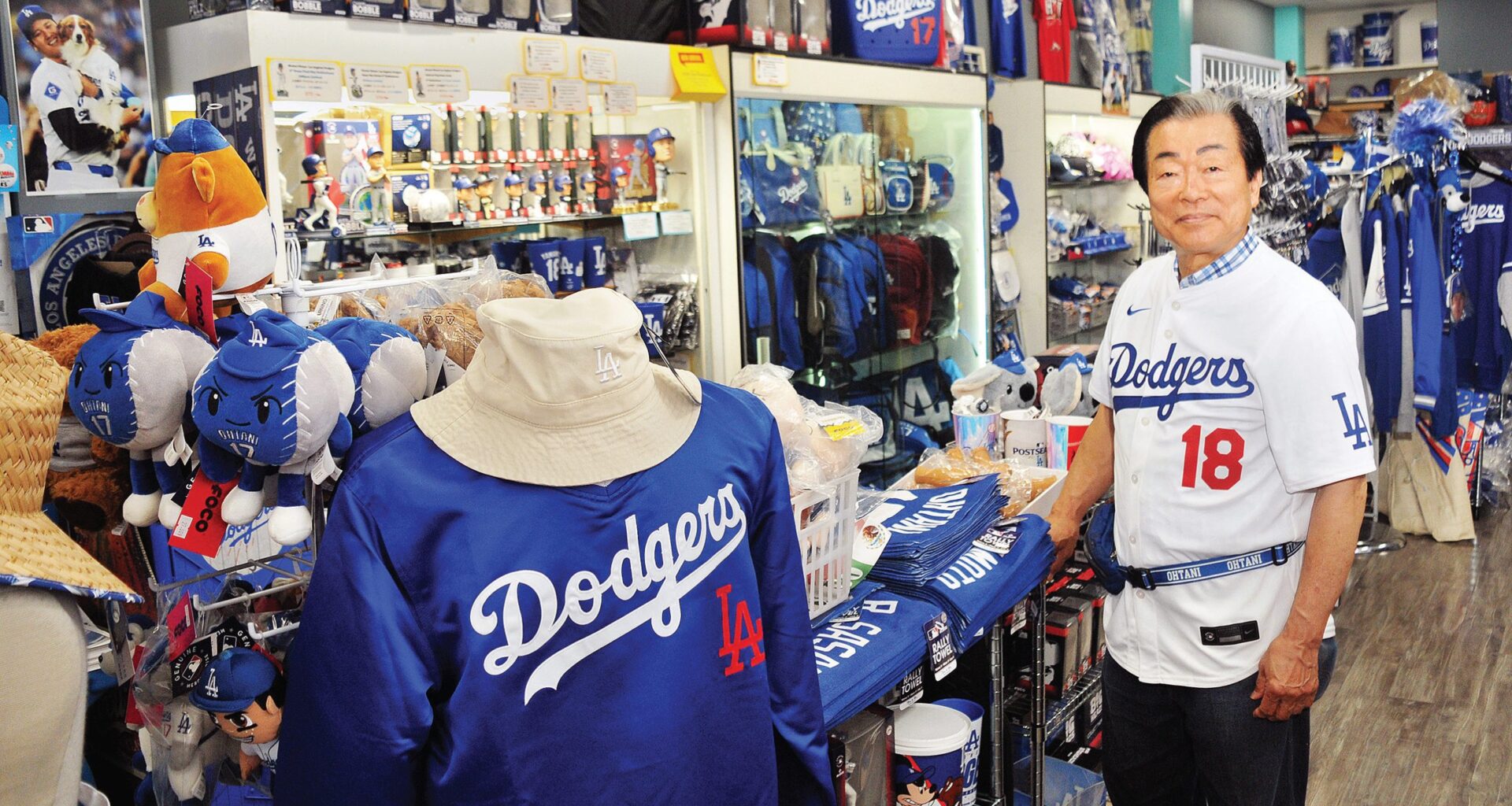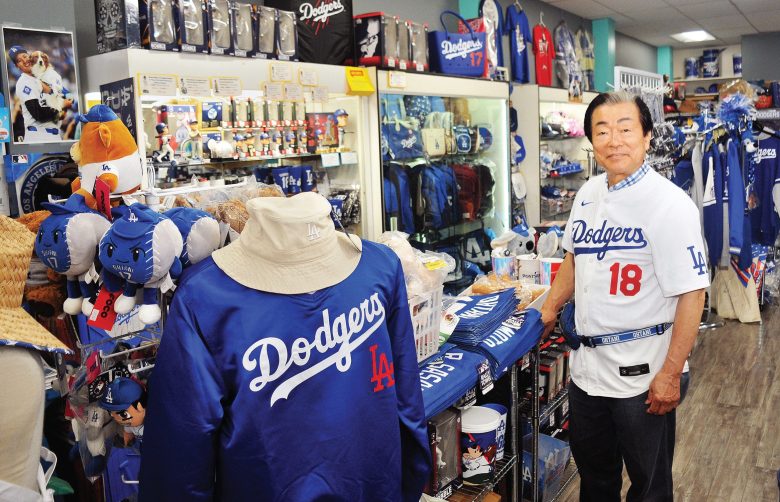 MIKEY HIRANO CULROSS / Rafu Shimpo
MIKEY HIRANO CULROSS / Rafu Shimpo
Akira Fujimoto opened his first Olympic Shop in Little Tokyo in 1975, after leaving Japan with a plan to see the world. His current store on First Street boasts possibly the largest selection of official Dodgers and Shohei Ohtani merchandise outside of Dodger Stadium.
Akira Fujimoto is celebrating 50 years of his Olympic Shops in Little Tokyo, with gratitude, generosity and an all-star concert.
By MIKEY HIRANO CULROSS
RAFU STAFF WRITER
It’s one of the liveliest businesses in Little Tokyo, a small store on First Street that buzzes with customers daily, due in no small part to the excitement that has followed baseball star Shohei Ohtani to Los Angeles.
The store carries one of the widest selections of official Dodgers souvenirs and collectibles outside of the stadium, with local fans, visitors from abroad, even the mayor of Los Angeles stopping by. However, Olympic Shop is hardly a newcomer to the neighborhood, not by decades.
“When Ohtani moved from the Angels to the Dodgers last year, I knew one shop needed to be dedicated to carrying Dodgers souvenirs,” said Akira Fujimoto, who is celebrating 50 years since opening Olympic Shop in Little Tokyo. “He’s really popular, and tourists are coming to L.A., staying in the [nearby] Miyako Hotel or DoubleTree Hotel, and this shop is right here, in between them.”
Fujimoto estimates his store carries over 400 different Dodger items, mostly featuring Ohtani and his Japanese teammates Yoshinobu Yamamoto and Roki Sasaki. The store is managed with great enthusiasm by his daughter – and unabashed Dodger fan – Rumi, who said the shop’s sales have grown so quickly that she cannot get many items into the store quickly enough. Following the team’s World Series win last year, she scrambled to find suppliers who could produce licensed Dodgers championship gear in time for the victory parade last Nov. 1.
While this is certainly a boom time for the store, Fujimoto said he has weathered lean times and enjoyed healthy eras, such as the mania surrounding the arrival of pitcher Hideo Nomo to the Dodgers in 1995. From the outset, his ability to recognize what was happening around him has been his greatest asset.
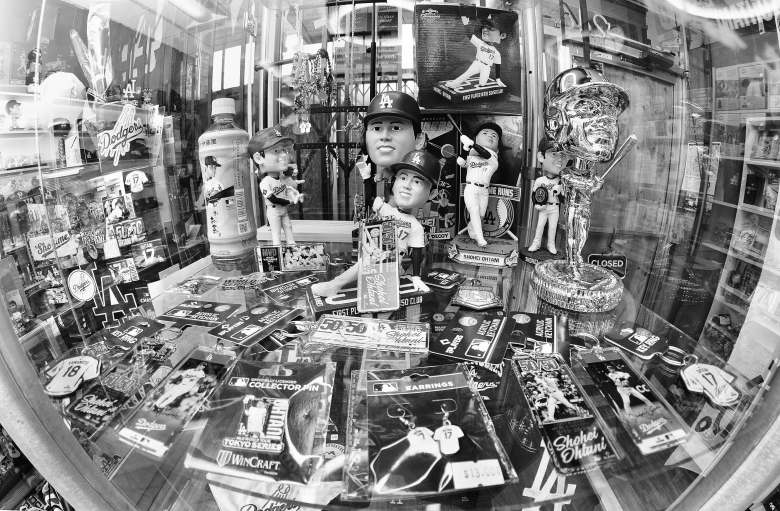 MIKEY HIRANO CULROSS / Rafu Shimpo
MIKEY HIRANO CULROSS / Rafu Shimpo
A native of Okayama City in western Japan, Fujimoto was in his early 20s working at Hitachi, then a behemoth of electronics and consumer products, but among the over 100,000 employees, he felt like one tiny grain of sand on a huge beach.
“At that time, many young people wanted to go overseas,” he recalled. He set out to explore the world,with California being the first stop. He didn’t exactly take the express, however.
“I came here on an immigrant boat, called the Brazil Maru, with around 450 passengers,” he explained. “It took 18 days, starting on March 3. It took one week to arrive in Honolulu, where we stayed for two or three days. A few got off in Hawaii, then maybe 40 young people got off when we got to Los Angeles. The rest, around 400, went on as immigrants to Brazil.
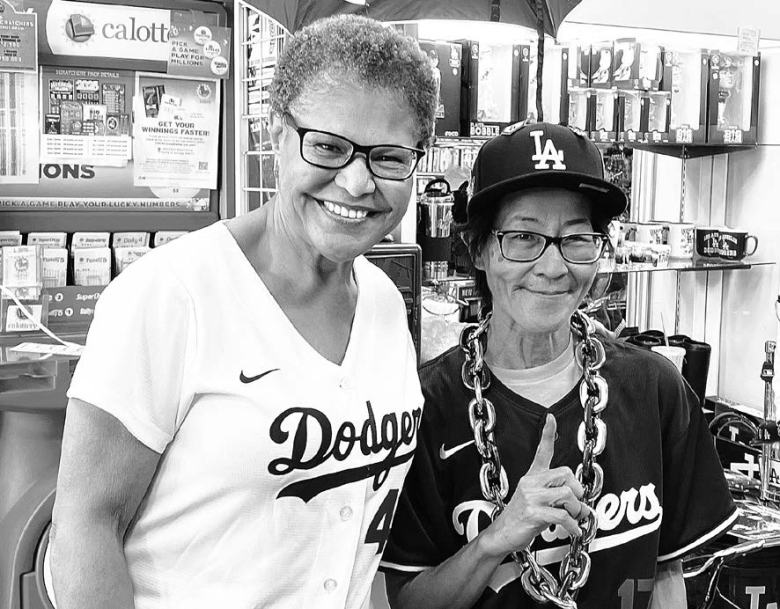 Courtesy Rumi Fujimoto
Courtesy Rumi Fujimoto
Fans have flocked to the current Olympic Shop for Dodger gear, including L.A. Mayor Karen Bass, pictured with Rumi Fujimoto last November.
Fujimoto had a visa to visit then study for a couple of years in the U.S., before seeing a solid business opportunity.
“That was a very good time for souvenir shops that attract tourists, mostly from Japan, so I applied for the investment visa and opened my gift shop in 1975. At that time, you could get a business visa with an investment of only $30,000. Now, I think it’s a million in California, half million in Hawaii or Nevada, but at that time, it was very low.”
His timing couldn’t have been better, as the American Bicentennial came less than a year later. The booming Japanese economy brought scores of visitors to California, many wanting to see Little Tokyo and join the celebration of the nation’s 200th birthday.
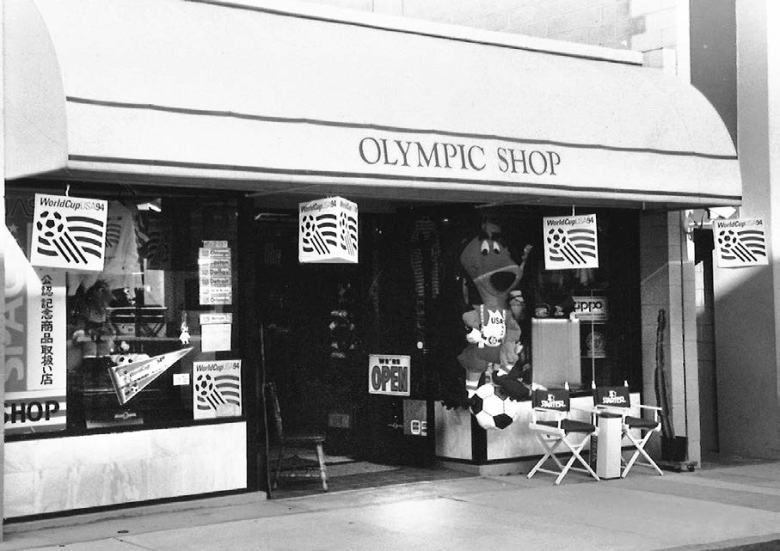 Olympic Shop was a prime source for merchandise during the World Cup in 1994, and “Nomomania” that arrived with Dodger pitcher Hideo Nomo.
Olympic Shop was a prime source for merchandise during the World Cup in 1994, and “Nomomania” that arrived with Dodger pitcher Hideo Nomo.
“I had no idea what the Bicentennial was then, but it helped me quite a lot,” Fujimoto admitted.
The good times kept on rolling, especially with L.A. hosting the Summer Olympics in 1984. By that time, the naming of his shop almost a decade earlier seemed like genius
foresight, and he expanded to three storefronts.
All booms eventually bust, and such was the case after the Japanese economy crashed in the early 1990s. Tourism dropped sharply, and gift and souvenir shops around Little Tokyo shuttered. Fujimoto said it was a stroke of great fortune amid the carnage that secured his future.
“I kind of got lucky. The Japanese owner of the building where I had my shops went bankrupt in the crash, and asked if I wanted to buy the property,” he said.
He jumped at the chance, believing that real estate is the most stable form of business in the U.S. He opened several more Olympic Shops, expanding to seven locations in Downtown L.A.
The Nomo years brought many tourists back, but Olympic Shop was not immune to the devastation stores across Little Tokyo felt after the Sept. 11, 2001 terrorist attacks, which brought the U.S. business landscape to a standstill. The store closed briefly, managed to withstand the 2008 recession, and relocated around the corner from its original location on Weller Street (now Ellison Onizuka Street) to its current spot on First Street.
“Thankfully, by that time, most of my income was coming from rental properties, so I was okay,” Fujimoto said.
Now at age 75, Fujimoto makes sure the community he has called home for the better part of his life feels the gratitude he holds for his good fortune. He is the vice chair of the Japanese Chamber of Commerce of Southern California and is president of the local Okayama Kenjinkai, an association of those with ties to his home prefecture in Japan. When plans were finalized for the nearby Terasaki Budokan athletics complex in the 2010s, Fujimoto sent over a check for $100,000.
On July 18, he presented the Koreisha o Mamorukai with a $10,000 donation, to show his appreciation for their work at the Seinan Senior Citizen Center.
In recent years, he has discovered a new passion, and is parlaying that into another way to celebrate Olympic Shop’s milestone and give back to the community.
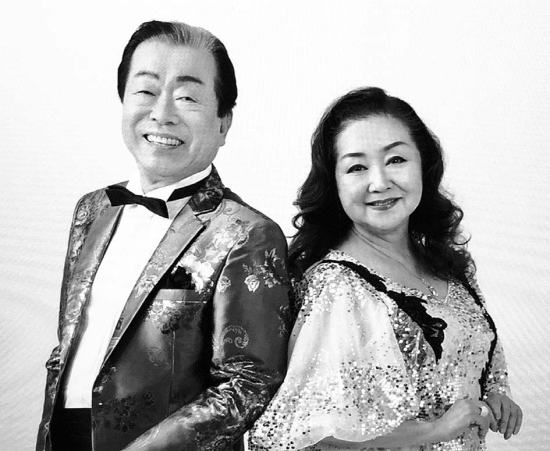 Archive photos courtesy Akira Fujimoto
Archive photos courtesy Akira Fujimoto
Abe joined Fujimoto’s concert in Little Tokyo on Aug. 10.
On Aug. 11, Fujimoto will host an all-star music showcase at the Aratani Theatre in Little Tokyo, featuring more than two dozen singers of enka, the popular Japanese ballad style. He is even bringing six of Japan’s top enka performers, including Shizue Abe, the star who wandered into Olympic Shop during a visit to L.A. in 1978.
“She came into my store 47 years ago, we met, and she’s now a member of the Japan Singers Association,” he noted. “I see her whenever I go to Japan.”
The concert will star members of both the Japanese and American branches of the association, and will take place during the height of Nisei Week, beginning at 11 a.m. and ending just ahead of the Grand Parade.
The JSA is dedicated celebrating and improving the skills of singers, as well as contributing to the development of music culture in Japan and abroad by promoting popular songs through their singing activities.
A fan of karaoke in his younger years, Fujimoto rediscovered singing five or six years ago and performs regularly, including at an annual music festival in Little Tokyo. He and Abe recently collaborated on a recorded duet, and in the last few years he has become a noted lyricist for Japanese singers. He co-wrote “Umi wo Watatta Jinsei” (“Life Across the Ocean”), a major hit for enka star Yuji Kitagawa in 2022, and the group Los Indios took his “Como Esta Los Angeles” to No. 1 on the Japanese enka charts last December.
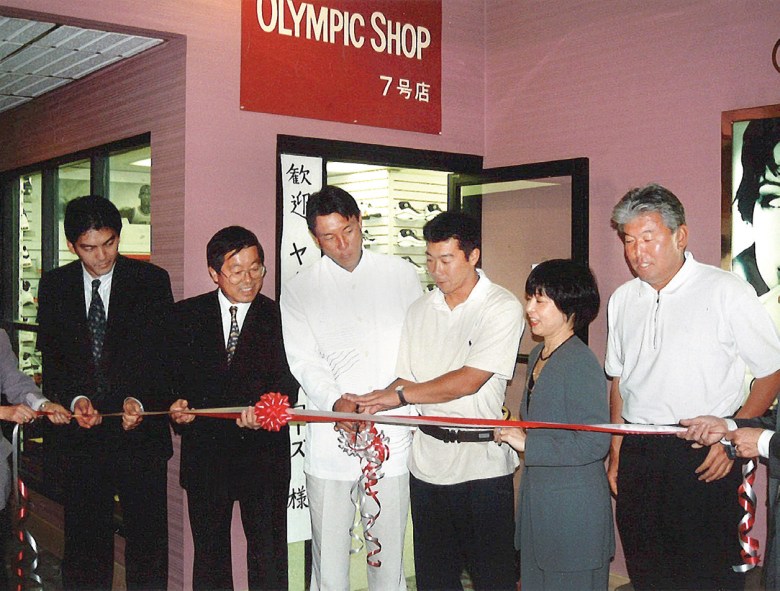 Fujimoto (second from left) opened as many as seven Olympic Shops, including one inside the Miyako Hotel in Little Tokyo. Cutting the ribbon at the grand opening in 1993 are stars of the Yakult Swallows baseball team in Japan, Takahiro Ikeyama and Tetsuya Iida.At right, Fujimoto’s wife, Fumiko, and Swallows coach Hiroshi Kamizuru look on.
Fujimoto (second from left) opened as many as seven Olympic Shops, including one inside the Miyako Hotel in Little Tokyo. Cutting the ribbon at the grand opening in 1993 are stars of the Yakult Swallows baseball team in Japan, Takahiro Ikeyama and Tetsuya Iida.At right, Fujimoto’s wife, Fumiko, and Swallows coach Hiroshi Kamizuru look on.
In addition to Fujimoto and Abe, the showcase in Little Tokyo will feature JSA president Yasuo Tanabe, Yumiko Kokonoe, “Snow Falling on Cedars” actress Youki Kudoh, Los Indios frontman Yuki Kashima and Michito Gohda.
While he’s been able to visit many different places around the globe, the world tour he envisioned as a 22-year-old never really got past L.A.
“As a young man, I never imagined living in America,” he said. “When I came here, I thought maybe I was going to travel around the world, but when I got here that March, the weather was so nice, I stopped.”
Articles for you
